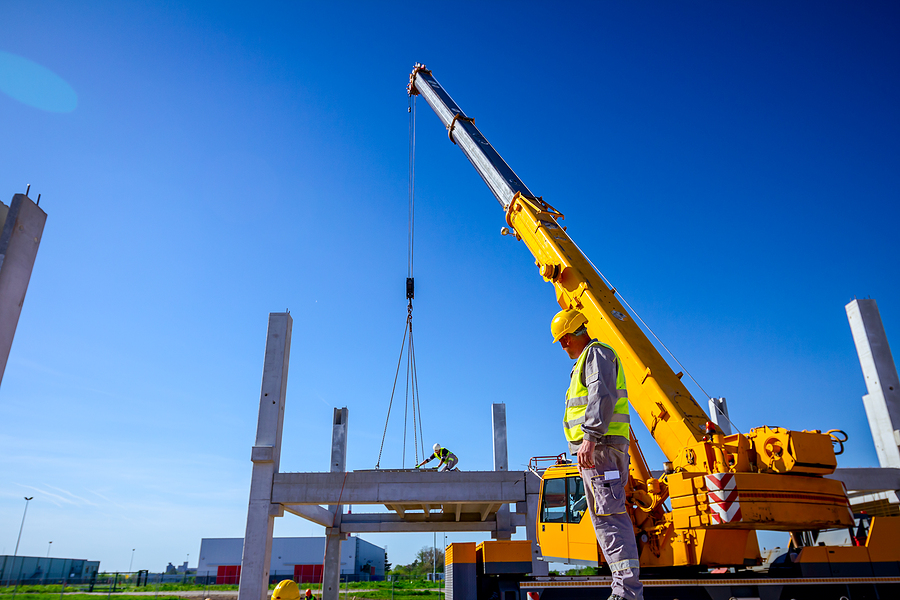Sustainable Concrete Poured Commercially For The First Time
The world’s first graphene concrete slab has been laid commercially, a milestone that helps significantly reduce the environmental cost of concrete.
The new hybrid material is 30 per cent stronger than standard concrete, which significantly reduces the amount required for building projects and surfacing contractors.
This breakthrough was the result of a joint project between the University of Manchester and Nationwide Engineering, who laid the slab down at the Southern Quarter Gym in Solstice Park in Amesbury, a few miles east of Stonehenge.
The single floor slab was made by what the team have called concretene, which removed much of the building material and all of the steel rebar that is standard with concrete construction projects.
A representative of the University of Manchester called the project a breakthrough that could revolutionise the concrete industry and reduce its significant effect on the environment.
According to their data, if concretene is used worldwide, it could on its own reduce carbon emissions globally by 2 per cent, a reduction equal to the entirety of the shipping industry.
Why Is Concrete An Environmental Issue
The production of concrete is the third-largest emitter of carbon dioxide emissions, behind only the overall emissions generated by China and the United States of America.
Part of this is a result of the chemical process used to make cement, which releases carbon dioxide and lime when calcium carbonate is heated. The other part is the energy required to heat the cement to form clinker, often to temperatures above 1500 degrees Celcius.
As well as this, concrete production requires a lot of water, currently amounting to 1.7 per cent of all water use.
Finally, most construction concrete is reinforced with steel rebar, which gives concrete tensile strength and reduces the risk of cracking. However, the steel required has its own carbon cost as well.
There have been other suggestions to reduce the effect of concrete on the environment, such as using fly ash, slag or bottom ash to replace clinker, as well as mixtures that can bond more effectively with less water.
The simplest way to reduce the impact concrete has on the environment is to require less of it. This would require less heat to create it, less carbon dioxide emitted during the process and less water needed to start the mixing process. This is where concretene comes in.
How Does Concretene Work?
Concrete sets through two chemical reactions known as hydration and gelation. Hydration is where the cement reacts to the water and gelation is where this paste mixture bonds and hardens. Once dry it becomes an exceptionally strong material.
Adding graphene helps in several ways. The first is that it acts as a mechanical support that increases the strength of the concrete. As well as this, it also serves as a catalyst surface, which makes the bonding process more effective.
The result is concrete that is stronger, more durable and more resistant to corrosion.
Whilst the process of creating concretene is different, the process of mixing it, laying it and letting it set has not changed, meaning that no extra training or equipment is needed on the part of the construction firm.
Read more
Five Steps To Take Whilst Operating A Mobile Crane
Mobile cranes are a critical part of most building construction projects, but like any other piece of industrial equipment, it is vital that any construction firm that operates a crane hire does so as safely as possible, which involves both the machine itself and also the surrounding site.
Crane safety is covered by the Lifting Equipment Regulations 1998, which stipulates that all work using lifting equipment, such as cranes, hoists and gin wheel pulley systems, must be properly planned, supervised and carried out safely.
Here are five important steps to take whilst operating a mobile crane.
Make A Plan
Write out a detailed plan for the lifting operations that will allow you to undertake the work safely, and ensure that everyone involved with the operation reads and understands it.
Parts that should be included in your plan include:
- The criteria behind your selection of a suitable crane, as well as set up and examination provisions,
- Site preparation,
- Safe slinging and signalling arrangements,
- Details of the trained staff operating the crane, and others involved in the operation,
- Supervision details and the authority of the person supervising,
- Any other relevant examinations, reports and documentation,
- Measures to prevent unauthorised use or movement of the crane,
- Safety measures for everyone else on-site not involved in lifting.
Record this information in a place and a way everyone can refer to.
Check The Equipment
Make sure you complete a full inspection of the crane before you start work, checking for any structural, hydraulic, electrical or mechanical issues, as well as checking fuel and fluid levels to ensure the machine will work optimally during the entire length of the operation.
Check the load charts as well, and make sure you and any other operator fully understand what they mean before starting.
Check Above And Below The Crane
Make sure the crane has been set up on stable, secure ground, with no chance of the crane slipping or moving. Ensure that the area you have set up is free of traffic and pedestrians, blocked off for as long as is necessary to do the work.
As well as this look for overhanging hazards like wires, tree branches and other potential dangers.
Check Your Personnel
Make sure that your crane operators are accredited and certified and ensure that only qualified personnel are in the crane cab during its operation.
As well as this, ensure that everyone else on site is aware of the procedures involved with working with a crane and do not put themselves or others in unnecessary danger.
Stop Whenever Something Feels Wrong
If at any point during the lift something feels wrong, stop as safely as possible and reconsider how to accomplish the task.
With lifting equipment, safety comes above everything else, and if a lift at any point does not feel safe, it is a warning sign that there may be a safer way to handle the task.
As well as this, ever override the computer system. It is aware of the maximum loads and tolerances of the crane and overriding it could place the site in danger.
Read moreSheffield Schools And Colleges To Take Part In International Study Scheme
The Sheffield Star reports that schools, colleges, and higher education providers in the region will be invited to take part in a ‘life changing’ study abroad scheme which is funded by the UK Government. Students will be encouraged to apply for the Turing Scheme, which replaces the Erasmus Scheme.
The Turing Scheme, named for the British scientist and mathematician Alan Turing, will provide funding for international opportunities in education and training around the world. It will be open to UK and British Overseas Territories organisations, encompassing a broad range of training and educational institutions.
The experience of travelling and studying abroad is invaluable in helping young people with their personal development, expanding language skills, employability, and understanding of other cultures. The new scheme is being hailed as an ambassador for ‘Global Britain’, helping to enhance international relationships.
Rani Moorcroft MBE FRSA, who instigated ‘Turing passport to the world’, said: “Sheffield is a thriving community, a young community. The council is already looking at race disparities. All the component parts are there. Sheffield can be a leader - taking the lead in tackling some of the most difficult issues.”
Moorcroft said that the coronavirus pandemic has exacerbated inequalities, particularly among young people, who are in danger of becoming disengaged and underoccupied. She highlighted the importance of giving the younger generation something to aim for and look forward to.
The organisers of the £110m Turing scheme will be keen to attract applicants from a diverse range of economic, cultural, and ethnic backgrounds, according to the Star article. The first placements and exchanges will take place from September 2021.
Commonwealth countries such as the Caribbean, Sri Lanka, Kenya, Jamaica, India, and Nigeria will be a part of the programme. Students will be able to take part in a range of activities, such as teaching English in schools, and working for environmental, social and governance programmes.
There will also be the opportunity to take part in safaris, pick tea leaves, and plant mangroves. Moorcroft views these activities as a chance for members of the Windrush generation to give something back to their parent countries. She is especially keen to break down barriers to achievement for younger people.
Moorcroft has also founded a community interest company called Zedgeneration, which encourages small global communities to work together and built a better future.
They have partnered with a not-for-profit social enterprise company called Catalyst in Communities, and also Buildeco, a construction company which works in partnership with councils and housing associations to provide modular flat-pack eco-designed housing.
Robin Lockhart FRSA, director of Catalyst in Communities and a Commonwealth Youth ambassador, said: “All new knowledge exists outside of our comfort zone and our job as Youth Coaches at Catalyst In Communities is to facilitate processes that stretch the comfort zone.”
Together the organisations hope to create ways of working and living sustainably, both at home and overseas. They are keen to invest in the green economy, lower fuel bills, reduce poverty levels, and mitigate the effects of climate change.
If you are looking for educational furniture, please contact us today.
Read moreBarnsley Roads And Paths Set For Improvements
Like any other town in Yorkshire and Lincolnshire, Barnsley will have seen its fair share of winter damage to roads and footpaths caused by the cold and wet weather. In response, Barnsley Council has announced its fund to carry out repair work.
According to a cabinet report that is set to be approved next week, the local authority is to spend £18.6 million over the 2021-22 financial year on repairs, of which £2 million has been specifically set aside for potholes, the Barnsley Chronicle reports.
Tarmac surfacing contractors across Yorkshire will be looking to get contracts for the work, which will see a range of projects taking place to fix damaged roads in the district. Indeed, work has already started on some schemes, with £2 million being spent so far this year up to the end of March.
Resurfacing has taken place on the A634 Doncaster road between Darfield and Goldthorpe, while other work has included the development of a new dual use path for cyclists and pedestrians linking Ardsley and Darfield, improvements to traffic signals and improvements to roadside drainage.
The next major resurfacing project will be the roads in Penistone and Haigh, which will be given priority due to their comparatively poor state of repair. The road at Haigh passes under the M1, making it the responsibility of the council, although the work would have to be co-ordinated with Highways England as the operator of the motorway.
Penistone’s priority is the currently unadopted road to the town’s household waste recycling centre. The report noted that “its unprecedented usage of during the Covid-19 situation has seen significant deterioration of the carriageway due to unprecedented volumes of traffic”, making the construction of a proper road surface a priority.
However, the council has said it is having t carry out a “balancing act” as it allocates funds, since future revenue streams are subject to uncertainty after the establishment of the South Yorkshire devolution deal, which means the metro mayor Dan Jarvis has the power to decide where funds such as highway maintenance grants from central government are spent.
This means that £3.2 million of this year’s funding has been carried over to 2022-23 to balance the risks that there may be less cash available then than the council hopes to have.
“The level of funding for the council’s highways programme for 2022-23 and beyond remains particularly uncertain within both regional and national contexts, “said the councils’ highways boss Ian Wilson in his report to the cabinet.
Since no announcement has yet been made regarding funding, Mr Wilson said it is “unlikely” 2021-22 funding will be affected. Beyond that, however, apart from the general “uncertainty” over the distribution method of funds from the Department for Transport, “there remains a risk to the council as there is the possibility of a significant reduction of external funding coming”, he added.
Barnsley’s roads will have suffered wear and tear from a different array of factors over the winter. While the town itself will have many busy roads with a lot of traffic, the wider borough includes many rural areas and villages in the Pennines, some within the Peak District National Park. Rising to over 500 metres above sea level, these roads are most prone to severe winter weather.
Read moreGovernment Launches £10m School Behaviour Hub Programme
The Department for Education (DfE) has issued a press release to announce that they will be sending behaviour experts to support schools with poor discipline records. The new £10m ‘behaviour hub’ programme will be operating in time for the summer term. It is designed to help pupils re-engage with education after the lockdown.
The DfE say they have identified 22 schools with an excellent behaviour track record, who will provide mentors and trainers to support struggling schools. The teams from schools and academies who have consistently good OFSTED ratings for behaviour will advise participating schools with problem diagnosis, mentoring, and policy suggestions.
Education Secretary Gavin Williamson said: “Whether it’s supporting some of our most vulnerable and disadvantaged children with the routines and structures needed to help them fulfil their potential, or helping prepare young people for the expectations of the workplace, parents and teachers know that orderly and disciplined classrooms are best.”
Partaking schools will also have access to specialist government teams of advisors, open days at lead schools, hub networking events, and online forums to exchange ideas.
Tom Bennett, the Lead Behaviour advisor to the DfE, said: It’s been a real honour to recruit some of the best schools in the country to offer their support to other schools who want to refocus on behaviour and culture. Every school can, with assistance, be safe, calm places where everyone is treated with dignity, and students and staff can learn and flourish together.”
Gavin Williamson has also called for mobile phones to be banned in schools, the BBC News website reports. He claims that phones can facilitate cyber-bullying and use of social media can be harmful to mental health. Most schools already have some sort of policy to restrict mobile phone use in classrooms, and some do not allow them to be used at break times.
If you are looking for educational furniture, please contact us today.
Read more




